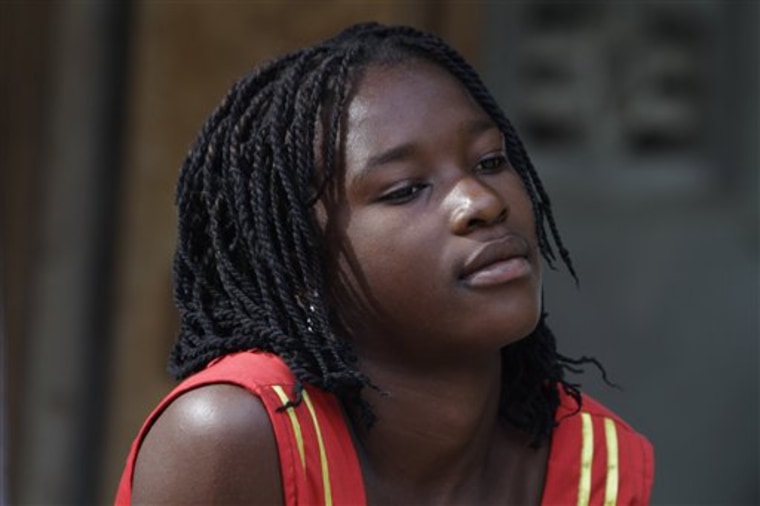The smiling teen who pokes her head out of the doorway of her grandmother's house is the embodiment of human resilience, someone whose very existence seems utterly impossible.
A year ago, Darlene Etienne was entombed in crumbled concrete and twisted steel. All around her, the sprawling city of Port-au-Prince was in ruins. Frantic family members and trained search teams dug through the debris for survivors but had largely given up hope of finding anyone else alive.
Then on Jan. 27 — a staggering 15 days after the earthquake that the government says killed more than 220,000 people — people heard her faint voice, weakly calling for help through the debris. Soon, a French rescue team was digging her out before hundreds of stunned onlookers.
She was covered in chalky white dust, like a ghost. Her eyes sunken, unfocused. A rescuer told The Associated Press at the scene that she would not likely have survived even for a few more hours if undiscovered.
Darlene now is an apparently healthy 17-year-old, living with her extended family in the rural Artibonite Valley, a rough three-hour drive on mostly dirt roads from Haiti's capital. AP journalists paid her a surprise visit and found a smiling teen, though she obviously hasn't forgotten her ordeal.
She recalls being conscious and awake the whole time she was trapped — in contrast to others who survived long periods under the rubble and said they spent much of the time dozing or drifting in and out of consciousness. And she remembers screaming for help, though the city was a cacophony of rumbling equipment and other noise in those desperate days.
"I could hear people passing by and I thought they were going to rescue me," she said in an interview Sunday. "But it was never me that they were rescuing."
Darlene, the middle child of three, had left her family for the first time just nine days before the magnitude-7.0 earthquake, traveling the 40 miles from Marchant Dessalines to live with her cousin and his wife while attending high school in Port-au-Prince.
The quake trapped unknown numbers of people, and some work crews are still recovering bodies. Among the victims was the wife of Darlene's cousin, crushed by a falling wall in the back of their house. No one thought there could be any other survivors in such wreckage.
A man scrambling over the wreckage in the Carrefour Feuilles neighborhood finally heard Darlene. She gave him her phone number and he called her family, who alerted rescuers. The French team evacuated her to a field hospital for treatment of severe dehydration, then to a medical ship just off the coast.
It was a remarkable rescue and it provoked skepticism amid the amazement. At least 135 people had been unearthed by rescue teams after the Jan. 12 quake, but most were found in the immediate aftermath. The French rescuers and doctors, though, believed she had been trapped the whole time.
Darlene is now back in school in Marchand Dessaline, surrounded by the rice fields that are the main livelihood in this part of Haiti. She shakes her head as she examines photos of her rescue and passes the picutres around to her family and neighbors in the village. It is hard to believe it's the same person.
Her mother, Kerline Dorcant, thanked God that her daughter was saved. Her hope now is that she will find some way to go abroad for a chance at a life better than what is available in rural Haiti.
"I am so happy, but I want her to go to another country because there is nothing for here," Dorcant said. "The only thing she has here is school and I don't want her to stay here. But I saw so many people die that I was so happy she was alive and I thank God."
